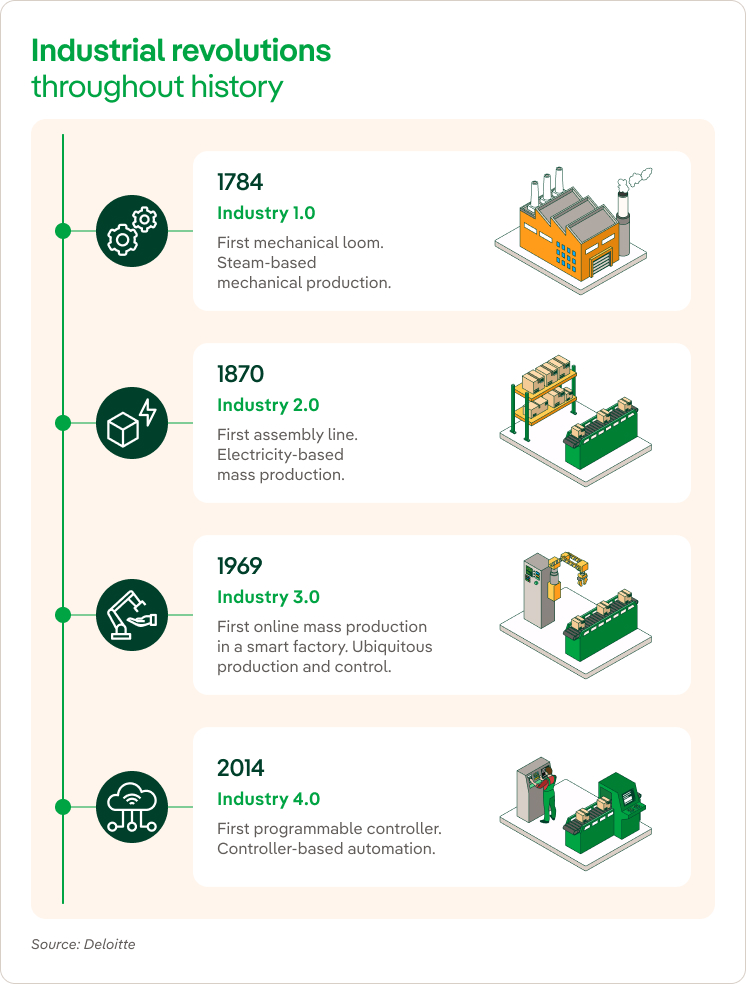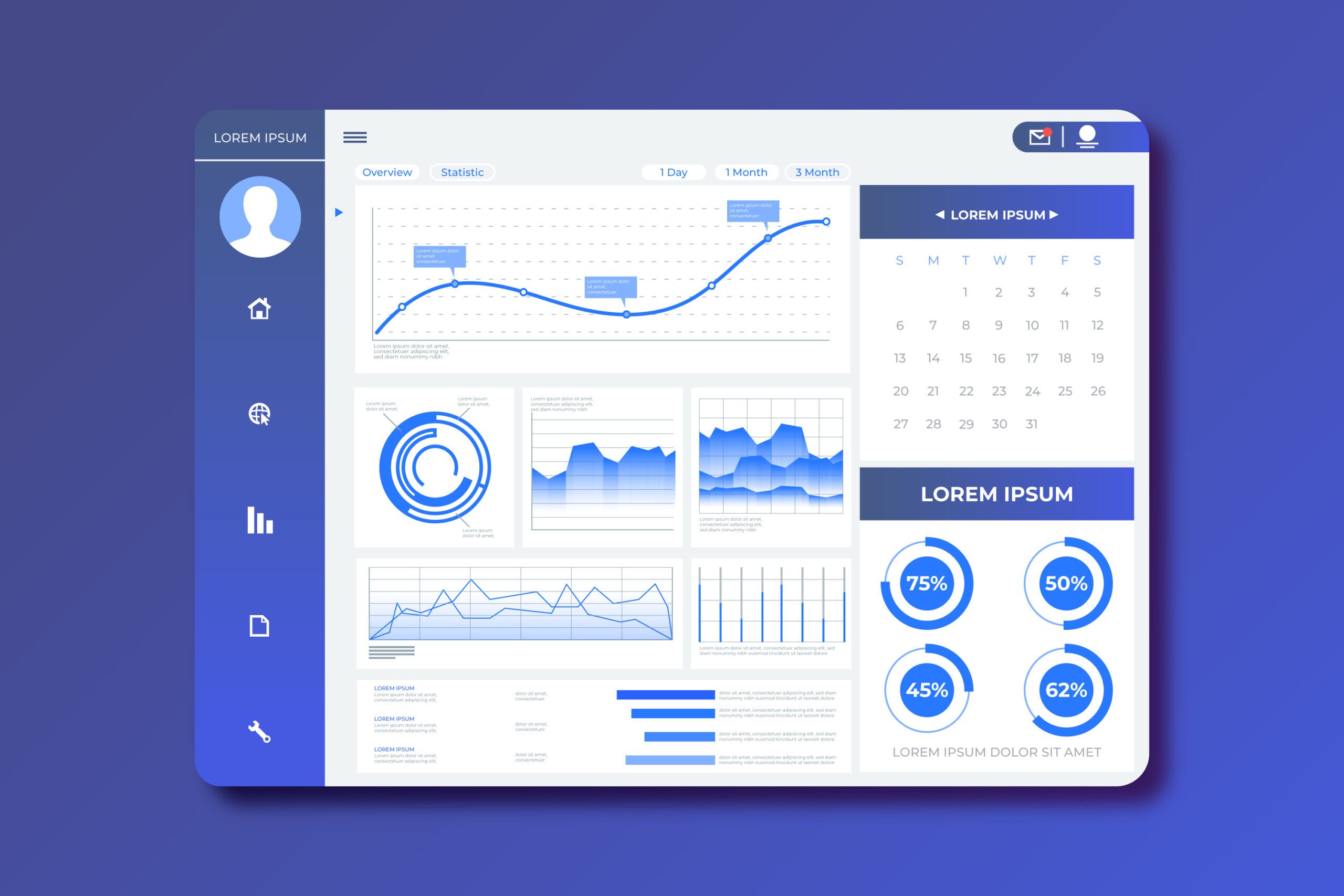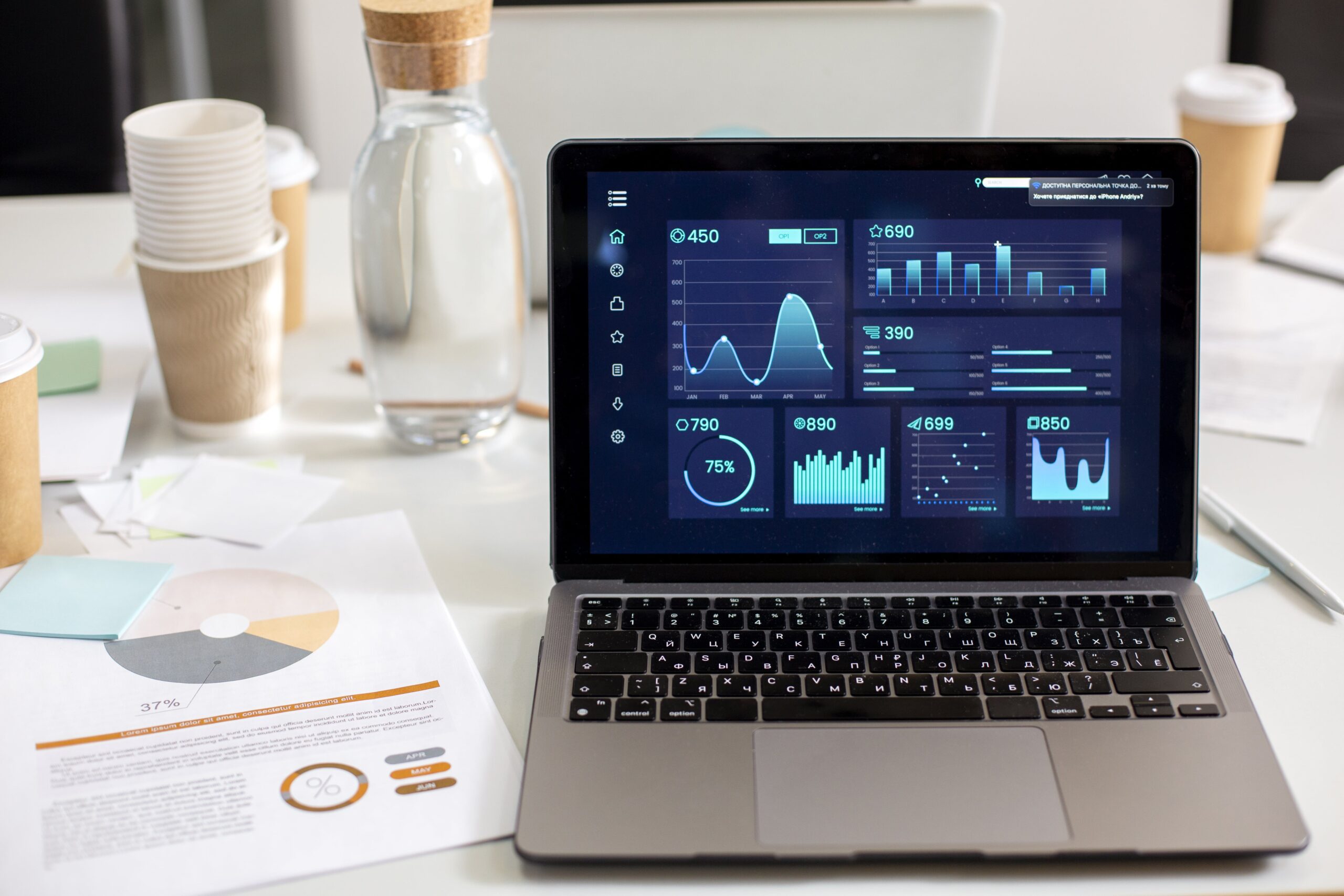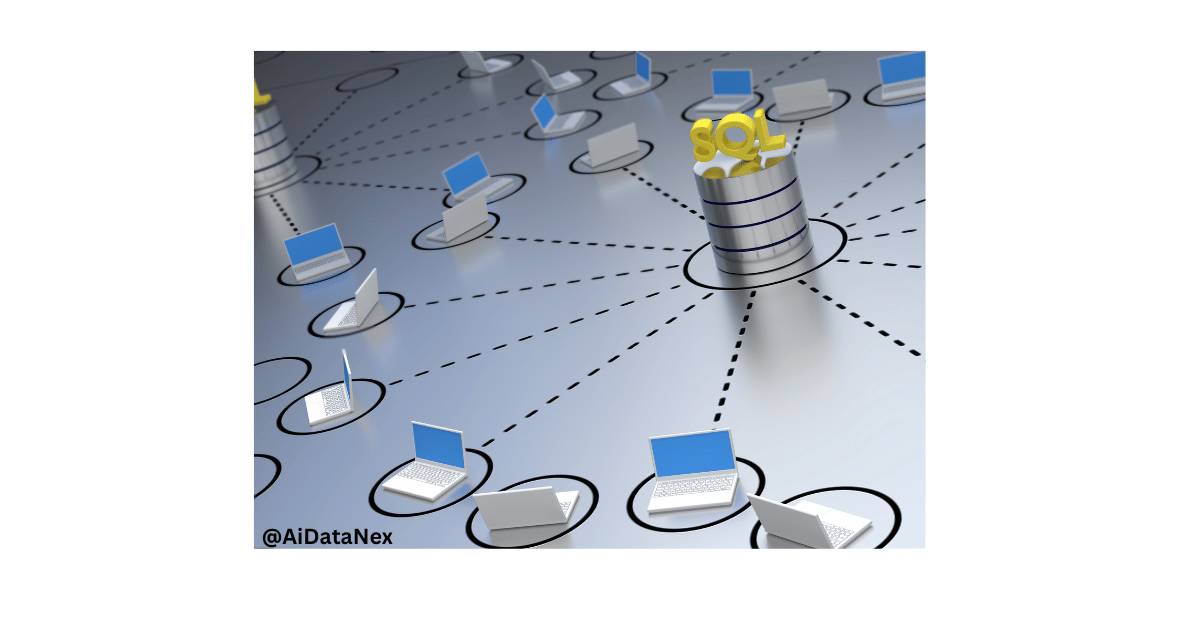The Fourth Industrial Revolution revolutionizes economies through advanced technologies like AI, IoT, and robotics. It drives innovation and efficiency, transforming industries.
The Fourth Industrial Revolution, also known as Industry 4. 0, integrates cutting-edge technologies into various sectors. This transformation hinges on advancements in artificial intelligence, the Internet of Things, robotics, and big data analytics. These innovations streamline operations, boost productivity, and reduce costs across industries.
Businesses leverage these technologies to enhance customer experiences and develop new business models. The economic impact extends globally, fostering competitive markets and creating new job opportunities. Industry 4. 0 empowers economies to adapt swiftly to changing demands, ensuring sustainable growth and development. This technological evolution marks a significant shift in how we live, work, and interact with the world.

Credit: www.weforum.org
Key Technological Advancements
The 4th Industrial Revolution is changing the world. New technologies are transforming industries. The economy is seeing major shifts. This revolution is driven by key technological advancements. These advancements are shaping the future. Let’s explore the main technologies behind this change.
Artificial Intelligence And Machine Learning
Artificial Intelligence (AI) and Machine Learning (ML) are leading this revolution. AI can perform tasks that usually need human intelligence. These tasks include speech recognition, decision-making, and language translation.
Machine Learning is a part of AI. It allows systems to learn and improve from experience without being programmed. This technology is used in many fields:
- Healthcare: AI helps in diagnosing diseases.
- Finance: AI detects fraud and predicts market trends.
- Retail: AI improves customer service through chatbots.
AI and ML are making processes faster and more efficient. They are helping businesses to save costs and increase productivity. AI is also creating new job opportunities in tech fields.
Internet Of Things (iot) And Connectivity
The Internet of Things (IoT) connects everyday devices to the internet. Smart homes, wearable devices, and smart cities are some examples. These connected devices communicate and share data. This leads to more efficient systems.
IoT improves quality of life. It provides real-time information and automation. Some benefits of IoT include:
- Smart homes: Control lights, temperature, and security systems.
- Health monitoring: Wearable devices track health metrics.
- Smart cities: Improve traffic management and energy use.
Connectivity is crucial for IoT. 5G networks offer faster and more reliable connections. This enables devices to work seamlessly. IoT is reshaping industries and making daily tasks easier.
Big Data And Analytics
Big Data refers to large volumes of data. This data comes from various sources like social media, sensors, and transactions. Analytics involves examining this data to find patterns and insights.
Big Data helps businesses make informed decisions. They can understand customer behavior, predict trends, and optimize operations. Some uses of Big Data include:
- Marketing: Targeting the right audience.
- Healthcare: Predicting disease outbreaks.
- Finance: Assessing risks and preventing fraud.
Big Data and Analytics are driving innovation. They help in creating personalized experiences for customers. Businesses can stay competitive by leveraging data insights. Big Data is a key factor in the 4th Industrial Revolution.

Credit: www.iberdrola.com
Transformation Of Industries
The 4th Industrial Revolution is changing how industries work. This new wave of technology is called Industry 4.0. It includes smart machines and advanced data analysis. These changes are transforming the economy. Let’s look at how different sectors are affected. The manufacturing, service, and agriculture sectors all see big changes.
Impact On Manufacturing Sector
The manufacturing sector is seeing a big change. Factories use smart machines and robots now. These machines can work without human help. They can also talk to each other. This makes factories more efficient. It also reduces errors and waste. Here are some key points:
- Smart machines can fix themselves.
- Robots can work 24/7 without breaks.
- Sensors can track the quality of products.
- Data analysis helps in making better decisions.
These changes also create new job opportunities. Workers need new skills to handle smart machines. Training programs are important for this. Companies invest in employee training to keep up with new technology.
Changes In Service Sector
The service sector is also changing fast. Artificial Intelligence (AI) and automation play big roles here. AI can handle customer service tasks. This includes answering questions and solving problems. This frees up human workers for more complex tasks. Some key changes include:
- Chatbots provide 24/7 customer service.
- AI helps in data analysis and decision making.
- Automation speeds up routine tasks.
- Virtual assistants help in scheduling and reminders.
These technologies make services faster and more efficient. Businesses can serve more customers in less time. This also improves customer satisfaction. New job roles are emerging in AI and data management. Workers need to learn new skills to stay relevant.
Revolutionizing Agriculture And Farming
The agriculture sector is not left behind. Smart tools and machines are changing farming. Drones and sensors help farmers monitor their crops. They can see which areas need water or fertilizer. This makes farming more precise and efficient. Some important points are:
- Drones can scan large fields quickly.
- Sensors can check soil health.
- Smart irrigation systems save water.
- Data analysis helps in planning crop cycles.
These technologies help farmers grow more food with less effort. They can also reduce waste and costs. Farmers need to learn new skills to use these tools. Training and support are crucial for this transition. The 4th Industrial Revolution is making farming more sustainable and productive.
Labor Market And Employment
The 4th Industrial Revolution, also known as Industry 4.0, brings tremendous changes. Advanced technologies like AI, IoT, and robotics are transforming industries and economies. The labor market and employment are heavily impacted. Understanding these changes helps people adapt and prepare for the future.
Automation And Job Displacement
Automation is changing the way we work. Machines and software can do many tasks that humans used to do. This can lead to job displacement. Jobs that involve repetitive tasks are the most affected. For example:
- Factory workers who assemble products.
- Cashiers who handle transactions.
- Data entry clerks who input information.
New technologies can do these jobs faster and cheaper. This is good for businesses but tough for workers. People need to learn new skills to stay employed. Some jobs will disappear, but others will change. Workers must adapt to new tools and methods.
Emergence Of New Job Roles And Skills
New technologies create new job roles. These roles require different skills than old ones. For example:
- AI specialists who develop smart systems.
- Robotics engineers who design and maintain robots.
- Data analysts who interpret complex data.
Learning new skills is crucial. Schools and training programs are evolving to meet these needs. Online courses and workshops help people gain relevant skills. Flexibility and lifelong learning are key to staying relevant in the job market.
Companies also play a role. They need to invest in employee training. This helps workers transition to new roles. Collaboration between industries and educational institutions is essential. Together, they can prepare the workforce for the future.
Global Economic Implications
The 4th Industrial Revolution is changing everything. It brings new technologies and ideas. These changes have big effects on the global economy. Companies can now do more with less. This means more jobs and more money. But there are also challenges. Let’s explore how this revolution impacts the economy.
Increased Productivity And Efficiency
New technologies like AI and robotics make work faster. Machines can now do tasks that took hours in minutes. This boosts productivity. Workers can focus on more important tasks. This means better products and services. It also means more profit for companies.
Benefits of Increased Productivity:
- More jobs in tech fields
- Better customer service
- Higher wages
- More innovation
Impact on Industries:
| Industry | Change |
|---|---|
| Manufacturing | Robots do repetitive tasks |
| Healthcare | AI helps diagnose diseases |
| Retail | Online shopping grows |
Trade And Supply Chain Transformations
Global trade is changing fast. Supply chains are more connected now. Companies can track products from start to finish. This reduces waste and saves money. It also makes sure products are high quality.
Key Changes in Supply Chains:
- Better tracking of goods
- Faster delivery times
- Less waste
- More reliable products
Impact on Global Trade:
| Aspect | Change |
|---|---|
| Shipping | Faster and cheaper |
| Inventory | Less stock needed |
| Quality | Higher standards |
Challenges And Opportunities
The 4th Industrial Revolution is changing the world. It brings new technologies and innovations. These changes impact the economy in big ways. There are both challenges and opportunities. We must understand and adapt to these changes to thrive in this new era.
Addressing Income Inequality
The 4th Industrial Revolution can widen the gap between the rich and the poor. Automation and AI can replace jobs. This can lead to income inequality. Many people might lose their jobs. They will need new skills to find work.
Governments and companies must work together. They need to create policies to help people. Here are some ideas:
- Job retraining programs to teach new skills.
- Social safety nets to support those in need.
- Tax reforms to ensure fair wealth distribution.
By addressing these issues, we can create a fairer and more equitable society. Everyone should benefit from the advancements of the 4th Industrial Revolution.
Adapting Education And Training Programs
Education and training programs must change. They need to prepare people for new types of jobs. Traditional education might not be enough. We need to focus on STEM (Science, Technology, Engineering, Math) subjects. These are important in the 4th Industrial Revolution.
Here are some steps to adapt education:
- Update curriculums to include new technologies.
- Promote lifelong learning to keep skills current.
- Encourage collaboration between schools and industries.
By making these changes, people will be better prepared. They will have the skills needed for the jobs of the future. This will help the economy grow and thrive.
Ethical And Security Concerns
New technologies bring ethical and security concerns. Data privacy is a big issue. Companies collect a lot of data. They must protect this data from hackers. There are also ethical questions about AI and automation.
Here are some key concerns:
- Ensuring data privacy and security.
- Creating ethical guidelines for AI usage.
- Addressing bias in AI algorithms.
We need policies to address these concerns. Governments and companies must work together. They need to create rules to ensure safety and fairness. This will help build trust in new technologies.
Government Policies And Regulation
The Fourth Industrial Revolution is changing the world. It is bringing new technologies and changing economies. Government policies and regulations play a key role in this transformation. They help foster innovation and ensure smooth technological integration.
Supporting Innovation And Entrepreneurship
Governments around the world are supporting innovation and entrepreneurship. They create programs to help startups and small businesses. Funding and grants are provided to help new ideas grow. These programs make it easier for entrepreneurs to start and grow their businesses.
Examples of government support:
- Grants and funding for new businesses
- Tax incentives for startups
- Business incubators and accelerators
- Training and education programs
Many countries also focus on research and development (R&D). They invest in universities and research institutions. This helps create new technologies and innovations. Public-private partnerships are encouraged to drive technological advancement.
Key areas of investment:
- Artificial Intelligence (AI)
- Robotics
- Internet of Things (IoT)
- Biotechnology
Regulating Technological Integration
Regulating technological integration is vital. It ensures that new technologies are safe and beneficial. Governments create policies and standards to guide technological adoption. These regulations protect consumers and businesses.
Areas of regulation:
- Data privacy and protection
- Cybersecurity standards
- Environmental impacts of new technologies
- Labor laws related to automation
Governments also focus on ethical considerations. They ensure that technologies are used responsibly. Ethical guidelines are created for AI and other advanced technologies. This helps prevent misuse and ensures fairness.
Steps taken by governments:
- Establishing ethics committees
- Creating transparency in AI algorithms
- Ensuring equal access to new technologies

Credit: www.weforum.org
Frequently Asked Questions
How Did The Industrial Revolution Impact The Economy?
The Industrial Revolution boosted economic growth by increasing production efficiency. It created jobs, spurred technological advancements, and expanded markets. This period saw significant urbanization and improved living standards. Overall, it transformed economies from agrarian-based to industrial-based, leading to sustained economic development.
How Is The 4th Industrial Revolution Going To Impact The Human Environment?
The 4th Industrial Revolution will enhance automation and connectivity, transforming industries. It may lead to environmental challenges and job shifts. Sustainable practices and policies are crucial to mitigate negative impacts.
What Is A Major Problem With The 4th Industrial Revolution?
A major problem with the 4th industrial revolution is job displacement. Automation and AI can replace human workers, leading to unemployment. This technological shift also raises ethical concerns and requires significant reskilling efforts.
What Are The Effects Of Industrialization In The Economy?
Industrialization boosts economic growth, creates jobs, and increases productivity. It leads to urbanization and higher living standards. Environmental pollution and resource depletion can also result.
Conclusion
The Fourth Industrial Revolution is reshaping the economy at a rapid pace. Businesses must adapt to new technologies. Embracing innovation leads to increased productivity and growth. Staying informed and agile is crucial for success. The future economy will be driven by those who harness the power of this revolution.







